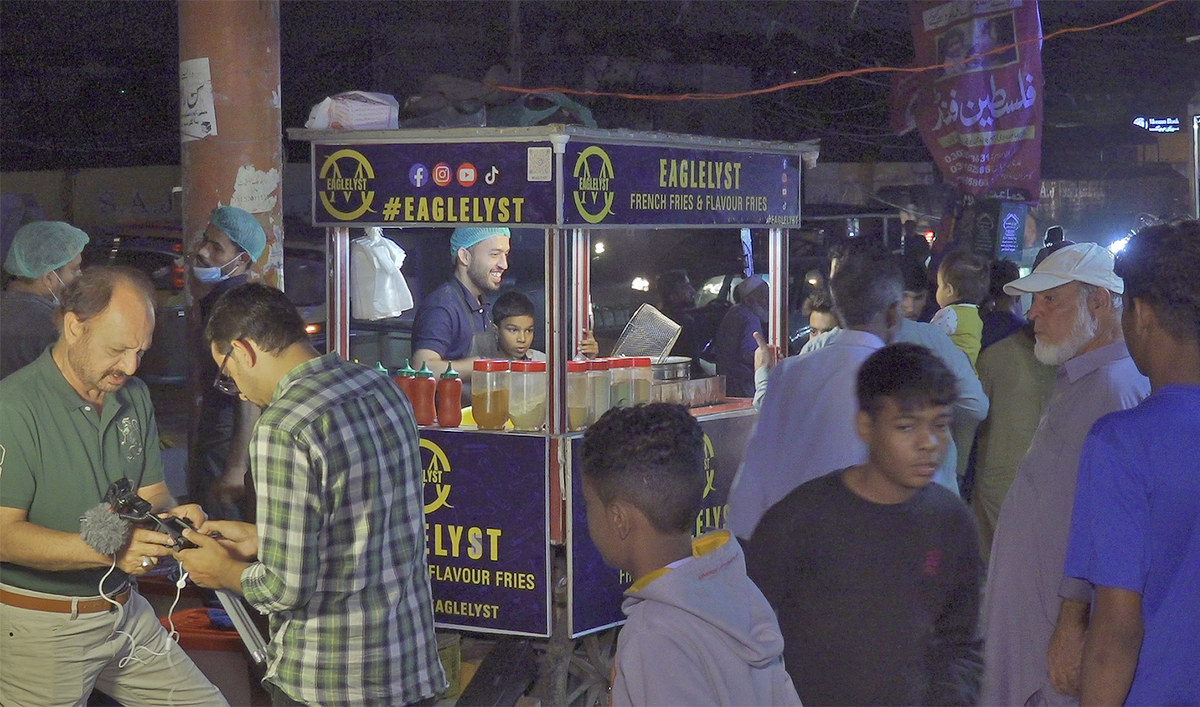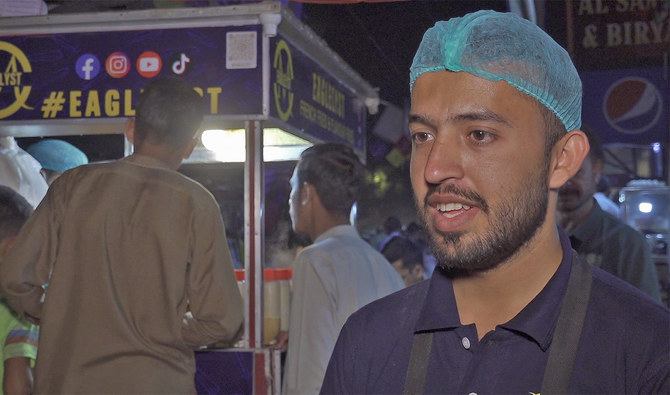KARACHI: It’s one of the more unusual overnight Instagram sensations: a fries stall in Karachi.
But a long line of customers now daily comes to Arbaaz Abbasi’s booth near the southern city’s National Stadium, drawn there by his unique idea to document his business journey online, showing social media users how he is turning his dream of being a successful entrepreneur into reality one fry at a time.
Since setting up his startup called Eaglelyst and first opening his stall on Feb. 12, the 25-year-old has recorded every step of his journey online, from hunting for a location to buying equipment and his daily sales and interactions with customers. Along the way, he has amassed nearly 200,000 followers on Instagram in less than a month and come to be known as the ‘fries seller’ or ‘fry guy.’
“People used to question me if this business is actually profitable enough … in fact, one of my friends at a recent get together challenged me to prove it so then it hit me,” Abbasi, who graduated with a degree in electrical engineering in 2019 and freelanced briefly as a web designer, told Arab News at his stall as he heaped fries into a white paper box for a customer.
“I decided not just to do it [open a fries stall] but also document how one can turn a small business into a success.”

Arbaaz Abbasi, owner of Eaglelyst, is seen selling french fries at his stall in Karachi, Pakistan, on March 10, 2024. (AN photo)
Abbasi gave himself a budget of Rs50,000, saying it cost him a little less than that amount to set up the entire stall, including purchasing ingredients, on day one:
“The setup included a stall, fryer and cutting machine that cost Rs30,000. Then I was left with 20,000 so I started looking for places where I could get the remaining stuff at low prices. I visited a lot of markets as I have shared in my [social media] videos too.”
The secret to his success, Abbasi said, were his “communication skills” and the amount of effort he put into market research.
“There is a hook and curiosity in my videos … Your communication skills, interaction with customers, everything comes into play. I go by the customers’ demands. This makes my business unique,” he said.
And research, and remaining on top of new trends, has always been a top priority:
“I watch videos on fries from all over the world. I have made some combinations such as mixing Japanese fries [recipe] with fries from the US, or with those in Belgium.”
Currently, Abbasi offers over 12 flavours including chicken tikka, hot and sour, fajita, Mexican, red chili, cheese, green chili and garlic, in addition to mixtures that he creates as per customer demand.
Tanzeel Abbas, one of Abbasi’s loyal customers, said he followed Eaglelyst on Instagram after friends and family recommended it:
“I am seeing this kind of content [on social media] for the first time. Having a start-up, showcasing the day-to-day journey and managing all of it. His struggling journey is an inspiration and that is why we come and have fries here daily.”
Kashian, another customer, vouched for the taste and said Abbasi’s flavours were “unique,” compared to other vendors in Karachi, a city where the food street industry is heavily saturated.
“I started watching [his journey] since day four on Instagram and that is what brought me here,” Kashan said. “He is showing everyone that no work is big or small.”
Though Abbasi has revealed his startup costs, he has chosen to not disclose his profits yet. And he says he has more tricks up his sleeve for the future:
“There is one thing I have kept a secret [in my videos so far],” he said, as he plunged freshly cut fries into hot oil in the fryer. “I’ll disclose it after day 30. It is important for those who want to set up a similar business.”
After day 30, Abbasi also plans to upload full tutorials on how he built his business, as a way of helping other aspiring entrepreneurs.
“I plan to turn Eaglelyst into a brand and continue documenting my series [of setting up a food business]. I hope to expand the stall into a franchise/branch,” he said.
“We will start off with fries and then I will slowly move to other food items as per the demand.”












